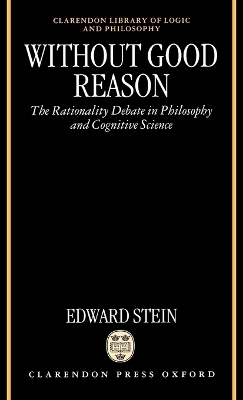
Without Good Reason
The Rationality Debate in Philosophy and Cognitive Science
Seiten
1996
Clarendon Press (Verlag)
978-0-19-823574-3 (ISBN)
Clarendon Press (Verlag)
978-0-19-823574-3 (ISBN)
A critical account of the debate in philoposhy and cognitive science about whether humans are rationale, in the CLARENDON LIBRARY OF LOGIC AND PHILOSOPHY series. Stein argues that the question of human rationality must be answered empirically.
Are humans rational? Various experiments performed over the last several decades have been interpreted as showing that humans are irrational--we make significant and consistent errors in logical reasoning, probabilistic reasoning, similarity judgements, and risk-assessment, to name a few areas. But can these experiments establish human irrationality, or is it a conceptual truth that humans must be rational, as various philosophers have argued?
In this book, Edward Stein offers a clear critical account of this debate about rationality in philosophy and cognitive science. He discusses concepts of rationality--the pictures of rationality that the debate centres on--and assesses the empirical evidence used to argue that humans are irrational. He concludes that the question of human rationality must be answered not conceptually but empirically, using the full resources of an advanced cognitive science. Furthermore, he extends this conclusion to argue that empirical considerations are also relevant to the theory of knowledge--in other words, that epistemology should be naturalized.
Are humans rational? Various experiments performed over the last several decades have been interpreted as showing that humans are irrational--we make significant and consistent errors in logical reasoning, probabilistic reasoning, similarity judgements, and risk-assessment, to name a few areas. But can these experiments establish human irrationality, or is it a conceptual truth that humans must be rational, as various philosophers have argued?
In this book, Edward Stein offers a clear critical account of this debate about rationality in philosophy and cognitive science. He discusses concepts of rationality--the pictures of rationality that the debate centres on--and assesses the empirical evidence used to argue that humans are irrational. He concludes that the question of human rationality must be answered not conceptually but empirically, using the full resources of an advanced cognitive science. Furthermore, he extends this conclusion to argue that empirical considerations are also relevant to the theory of knowledge--in other words, that epistemology should be naturalized.
| Erscheint lt. Verlag | 11.1.1996 |
|---|---|
| Reihe/Serie | Clarendon Library of Logic and Philosophy |
| Zusatzinfo | line figures, tables |
| Verlagsort | Oxford |
| Sprache | englisch |
| Maße | 144 x 224 mm |
| Gewicht | 518 g |
| Themenwelt | Geisteswissenschaften ► Philosophie ► Erkenntnistheorie / Wissenschaftstheorie |
| Geisteswissenschaften ► Philosophie ► Logik | |
| Geisteswissenschaften ► Psychologie ► Allgemeine Psychologie | |
| Geisteswissenschaften ► Psychologie ► Verhaltenstherapie | |
| ISBN-10 | 0-19-823574-7 / 0198235747 |
| ISBN-13 | 978-0-19-823574-3 / 9780198235743 |
| Zustand | Neuware |
| Haben Sie eine Frage zum Produkt? |
Mehr entdecken
aus dem Bereich
aus dem Bereich
die Grundlegung der modernen Philosophie
Buch | Softcover (2023)
C.H.Beck (Verlag)
18,00 €
Buch | Softcover (2023)
Reclam, Philipp (Verlag)
7,00 €


![Was heißt Denken?. Vorlesung Wintersemester 1951/52. [Was bedeutet das alles?] - Martin Heidegger](/media/113619842)